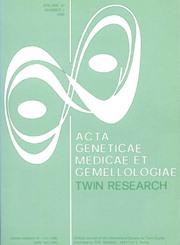Article contents
Multimethod Assessment of Temperament in Twins: Birth to Six Months
Published online by Cambridge University Press: 01 August 2014
Abstract
The predictive relationship between neonatal behavior and temperament at 6 months was assessed in 62 pairs of twins. The neonatal assessment evaluated irritability, resistance to soothing, reactivity, and activity level across various activities. Temperament at 6 months was appraised by a laboratory assessment, ratings on the Infant Behavior Record, and a questionnaire completed by the mother. Examination for temperament consistency from the neonatal period to 6 months indicated that (a) neonates rated by an examiner as irritable and difficult to soothe were reported by the mother to be more negative, irritable, and slower to adapt at 6 months; (b) neonates rated as more irritable and active were more attentive and responsive during mental testing at 6 months; (c) there was no relationship between the neonatal measures and the laboratory ratings, possibly reflecting methodological problems influenced by maturation and vegetative processes at 6 months. Analyses for patterns of concordance within the various data sets for MZ and DZ twins indicated that there was no pattern of differential concordance favoring MZ twins for the temperament measures at birth or at 6 months. It was concluded that a modest predictive relationship between temperament variables had been demonstrated from birth to 6 months, but no specific genetic effects were detected at these early ages.
- Type
- Review Article
- Information
- Acta geneticae medicae et gemellologiae: twin research , Volume 34 , Issue 1-2 , April 1985 , pp. 15 - 31
- Copyright
- Copyright © The International Society for Twin Studies 1985
References
REFERENCES
- 4
- Cited by


